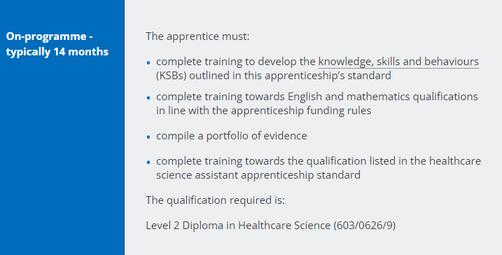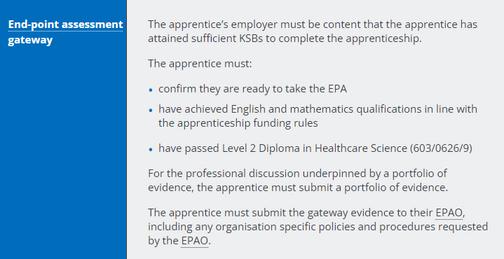









Throughout your apprenticeship you will have a trainer coach who will be your main point of contact with the college.
If you need additional support please contact anyone listed below for support and signposting to other services.
For general enquiries you can email apprenticeships@eastdurham.ac.uk or call 01915185508




Level: 2
Typical duration to gateway: 14 months
Typical EPA period: 2 months

Healthcare Science Assistants work in Life Sciences, Physiological Sciences, Physical Sciences, Clinical Engineering, Clinical Bioinformatics in environments such as outpatient departments laboratories and engineering workshops.
Healthcare Science Assistants are part of a wider team contributing to safe patient care across all care pathways from conception to end of life across all areas of healthcare science. The broad purpose of the occupation is to perform a range of routine technical and scientific procedures whilst in a clinical setting.
Healthcare Science Assistants follow standard operating procedures in order to select and prepare equipment and the environment for healthcare science procedures. They perform healthcare science tasks and tests appropriate to their role. They log, prepare, input and store data.
A Healthcare Science Assistant may also carry out stock control of equipment and consumables. In their daily work, an employee in this occupation interacts with a wide range of stakeholders including, healthcare science professionals, the wider multi-disciplinary healthcare team, patients and the public. They are likely to report to a Healthcare Science Associate or professional.
An employee in this occupation will be responsible for carrying out clinical, technical, scientific or administrative duties according to standard operating procedures. They follow specific protocols and adhere to health, safety, governance and ethical requirements. They are responsible for carrying out a range of delegated activities and solving routine problems using simple rules and tools. They are accountable for their own work performance and are expected to take ownership of their own career and professional development. Reference: ST0218
Duty 1 Perform a range of routine technical and scientific procedures and services in accordance with standard operating procedures, policies and protocols.
Duty 2 Select and prepare equipment and the environment for healthcare science procedures.
Duty 3 Carry out stock control of healthcare science equipment and consumables.
Duty 4 Support the provision of clinical care delivered to individuals and maintain client confidentiality.
Duty 5 Communicate effectively with individuals.
Duty 6 Record, report and store information adhering to information governance and confidentiality requirements.
Duty 7 Support a multidisciplinary healthcare team.
Duty 8 Maintain a healthy, safe and secure workplace.
Duty 9 Contribute to audit, innovation or research within scope of own role.
Duty 10 Maintain and develop own competence.


K1: The legislation, standard operating procedures, codes of conduct and ways of working that apply to own role.
K2: The scope of own role, including the limitations of own competence.
K3: The importance of probity, honesty and integrity in professional practice.
K4: The importance of mental health, wellbeing and resilience.
K5: The scope and range of services within healthcare science used to investigate, diagnose and treat disease.
K6: The evidence base that underpins technical practice relevant to own role.
K7: Stock and equipment management relevant to own role.
K8: The principles of person-centred care.
K9: The meaning and importance of 'duty of care' and safeguarding.
K10: The rights of individuals and own role with regard to giving informed consent.
K11: The principles that underpin dignity, rights and privacy.
K12: The importance of individuals being actively involved in making informed choices about their care.
K13: How to explain technical terms in language others can understand.
K14: Barriers to communication and techniques for addressing them.
K15: The importance of information governance and confidentiality.
K16: The importance of accurate data and processes including digital considerations.
K17: The policy or procedure for complaints and difficult situations.
K18: The importance of working within the multi-professional team and how healthcare science impacts on the wider delivery of services.
K19: Where to go for help and support.
K20: The principles of leadership, role modelling and how it applies to own role and that of others in the team.
K21: The importance of being aware of own strengths, limitations and behaviours and how these affect colleagues and the wider team.
K22: Legislation and policies relating to health and safety at work and own responsibilities.
K23: The meaning and implications of ‘risk’ and ‘risk assessment’.
K24: What to do in situations that could cause harm to self or others such as critical incidents.
K25: The principles of safe lifting and handling of individuals, equipment or other items.
K26: Infection prevention and control requirements relevant to own role.
K27: How to handle hazardous materials and substances.
K28: The quality procedures and improvement protocols and regulations relevant to own role.
K29: The audit cycle relevant to own role and how audit contributes to the maintenance and improvement of services.


K30: The importance of delivering high quality service outcomes and continuous improvements (including sustainability) to benefit individuals and health services.
K31: The regulatory framework that innovation or research is conducted, including research ethics and the implications for own role.
K32: The importance of service improvement, innovation or research.
K33: Reflective behaviours and the benefits of self-reflection in helping maintain and support the quality of patient care.
K34: The role of appraisal and performance review.
K35: How to prepare for and develop an action plan as part of performance review.
S1: Act in line with legislation, standard operating procedures, codes of conduct and ways of working that apply to own role.
S2: Work within the scope of the role, the limits of own knowledge and skills.
S3: Act in line with probity requirements.
S4: Promote own mental health, wellbeing and resilience.
S5: Provide general information, advice and guidance about the scope and range of services relevant to role.
S6: Provide technical evidence-based advice, information and guidance relevant to role.
S7: Adhere to stock and equipment control policies.
S8: Support the provision of person-centred care that is delivered by the wider healthcare team.
S9: Support any care provided including adhering to the relevant requirements.
S10: Follow policy and protocols that relate to informed consent.
S11: Protect the dignity, rights and privacy of individuals.
S12: Assist the wider healthcare team to enable individuals to make choices about their care.
S13: Communicate basic information effectively verbally and in writing.
S14: Use techniques to facilitate understanding and reduce communication barriers.
S15: Keep accurate, confidential records including in a digital format.
S16: Produce reliable data by logging, inputting, retrieving and storing information within required governance processes.
S17: Follow protocols for handling, escalating or reporting difficult situations and complaints.
S18: Work as part of the healthcare science team and the multi-professional team to provide healthcare science services.
S19: Follow delegation, reporting and escalation protocols appropriate to own role.
S20: Act as a role model to others and show leadership skills relevant to own role.
S21: Contribute towards creating the conditions that assist the team in providing a supportive environment for colleagues.

S22: Work safely in the workplace following safety guidelines.

S23: Contribute to the risk management process in own workplace adhering to risk management guidelines.
S24: Take appropriate action in response to incidents or emergencies.
S25: Move and transport items safely for example individuals or equipment and items.
S26: Apply a range of techniques for infection prevention and control.
S27: Follow guidelines and procedures for handling hazardous materials and substances.
S28: Follow procedures and improvement protocols to meet the requirements of quality standards relevant to own healthcare science practice.
S29: Contribute to the audit process relevant to own role.
S30: Offer suggestions for improving services, emerging practices and sustainability.
S31: Work in accordance with the regulatory frameworks for ethics, innovation or research relevant to own role.
S32: Assist service improvement, innovation or research within the boundaries of own clinical and scientific practice.
S33: Reflect on own practice and keep own knowledge and skills up-to-date.
S34: Take part in appraisal or performance review and ongoing continuing professional development.
S35: Reply constructively to the outcome of feedback, performance review or appraisal.
B1: Treat people with dignity.
B2: Champion equality and diversity.
B3: Show compassion, respect and empathy.
B4: Be honest, conscientious and committed.
B5: Committed to continuously developing their own professional practice.
B6: Committed to working to the standards of good practice for the Healthcare science professions.
This apprenticeship aligns with Academy for Healthcare Science for Healthcare Science Assistant Register (nonaccredited)
Please contact the professional body for more details.







https://www.instituteforapprenticeships.org/apprenticeshipstandards/healthcare-science-assistant-v1-1

Stepbystepofhowyourapprenticeshipwillrun.




Atyourskillsscanyouwillgooveranyknowledge,skillsandbehaviours youmayalreadyhavethatwouldbecoveredwithinyourapprenticeship. Thisisyourfirsttimemeetingyourtrainercoach.Themeetingwill includeyou,youremployer,andyourtrainercoach.


Bythetimeyoureachinductionyouwillhavefilledinallofthepaperworksenttoyou fromtheCollegeviaDocuSign.Youwillbeaskedtoprovideidentification, certificatesformathsandEnglishandanyevidenceofpriorlearning.
Atinductionyouwillbeguidedthroughapresentationoutliningthemainelementsof yourapprenticeshipprogrammeandyourrolesandresponsibilitiesasanEDC apprentice.Youwillalsobegivenanoverviewofwiderskillssuchassafeguarding, preventandBritishvalues.Includedisanintroductiontotheservicesyoucanaccess withinthecollegesuchasstudentsupport,counselling,travel,gymandinformation, adviceandguidance(IAG).

Whilstonprogrammethemajorityofyourtimewillbe spentintheworkplaceandmayincludedayrelease dependingonyourstandard,whichwillexplainedto youuponinduction.
Youwillgainthenewknowledge,skills,and behavioursneededtobecomecompetentinyourfield ofexpertisebytheendofyourapprenticeship,and willfollowanindividualandpersonalisedtraining plan.

Reviewsofyourprogramwillbeconductedevery1012weekswithyourself,employer/mentorandtrainer coachandaretheretosupportyourdevelopmentand measureyourprogresswhilstyouareanapprentice.


Gateway takes place once active learning has been completed and before your End Point Assessment (EPA). You, your employer and training provider will review, agree and sign to say that you have met the gateway requirements for your standard and are ready to enter the EPA gateway. They will check you have met the required knowledge, skills and behaviours and that you have sufficient evidence to meet the gateway requirements, and are ready to take your final synoptic assessment.


End-point assessment (EPA) tests the knowledge, skills and behaviours that you have gained during your apprenticeship. The unique EPA elements of each standard are designed to demonstrate your competency in your field of expertise.




Apprentices have a minimum requirement to complete 6 hours of off the job training per week. This will be recorded in your ‘Off the Job Log (OTJ)’ which during training must show how you are developing new knowledge, skills, and behaviours from your standard.
Off-the-job training can be achieved in a number of ways and you may be surprised to learn of the simple activities which count towards the achievement of your OTJ learning such as shadowing a colleague, company induction, in house training/CPD and assignment writing etc.

Apprentice
Trainer/Coach
Team Leader Director
College attendance is essential as an apprentice. If you are unable to attend college on your designated day for any reason, please inform your employer and your trainer coach of your absence as soon as possible.

Your college day is a normal working day as your employer pays you to be at college. If you fail to inform college of absence your employer will be notified, and this may lead to disciplinary actions in the workplace as a result.
Authorised holidays need to be discussed with your trainer coach as soon as they are agreed so you can be marked appropriately as absent.
Reporting an absence
If you are unable to contact your trainer coach use the details below to inform the apprenticeship team of the absence. apprenticeships@eastdurham.ac.uk










Youwillcoversafeguarding,prevent,andBritish valuesthroughoutyourentireapprenticeship.

Safeguarding is the process of protecting young people from harm and promoting their welfare.
At EDC we aim to help make strong, positive choices and develop skills to keep yourself, friends, and family safe.
Keeping Children Safe in Education 2023, which applies to all children and, defines safeguarding and promoting children’s welfare as: -protecting children from maltreatment. -preventing impairment of children’s mental and physical health or development. -ensuring that children are growing up in circumstances consistent with the provision of safe and effective care, and; -taking action to enable children to have the best outcomes.
The adult safeguarding duties under the Care Act 2014 apply to an adult, aged 18 or over, who: -has needs for care and support (whether or not the Local Authority is meeting any of those needs) -is experiencing, or at risk of abuse or neglect; and -as a result of those care and support needs is unable to protect themselves from either the risk of, or the experience of abuse or neglect.


Sexual harassment & exploitation Hate
Bullying Physical and emotional abuse Home issues/homelessness
Drug and alcohol misuse



Always wear your college ID badge
Report any accidents/incidents
Respect people & college facilities
Follow all codes of conduct & health & safety rules


Prevent is one strand of the UK’s wider counter-terrorism strategy known as CONTEST.
Prevent aims to stop people from becoming terrorists or supporting terrorism of any form.
Prevent provides early intervention and personalised support to divert people away from terrorism.
Prevent safeguards people and communities from the threat of terrorism.
If you have anything that needs reporting please the safeguarding team or in an emergency call 101.

The need for rules to make a happy, safe and secure environment to live and work.




Understanding that we all don’t share the same beliefs and values. Respecting the values, ideas and beliefs of others whilst not imposing our own others.
A culture built upon freedom and equality, where everyone is aware of their rights and responsibilities.

Protection of your rights and the rights of others around you.

Benefitsandfacilitiesyouhaveaccesstoasan EDCapprentice.










Onceyouhaveyourcollegeemailsetup,youcansign upforstudentdiscountsitessuchasUnidays,Student beans,andTotum. Youcanalsouseyoucollegebadgewhenfacetoface shoppingatsomeofyourfavouritehighstreetstores.,
Travel
Strugglingtogettoworkorcollege?
Once you are enrolled on your course you will receive a college badge. This badge can be used on any Arriva bus or our own East Durham College buses. For the bus time tables visit the EDC website.



East Durham College's counselling/therapeutic service is free and in place to support you throughout your study. All staff are fully trained professional counsellors or CBT practitioners.
What is counselling?
Counselling/therapy allows you to express anything that is concerning you. Doing so can help resolve concerns and clear issues. The counsellor is open to discuss all issues and their non-judgemental attitude allows them to be honest.

The Learning Resource Centre is open to all students with books of all genres and areas. As well as computers for you to complete work and assignments on. Printers can also be found in the LRC.
Peterlee Campus:
Monday: 8.30am till 5pm
Tuesday: 8.30am till 9pm
Wednesday: 8.30am till 9pm
Thursday: 8.30am till 9pm
Friday: 8.30am till 4.30pm
Houghall Campus:
Monday: 8.30am till 5pm
Tuesday: 8.30am till 5pm

Wednesday: 8.30am till 5pm
Thursday: 8.30am till 7pm
Friday: 8.30am till 4.30pm
Connect to the “Get Connected” Wi-Fi network on your personal device. 1. Click Start at the bottom of the page to accept the Terms and Conditions, then sign in with your College email address and password 2.
3. Your unique Wi-Fi password will then be displayed, you can use this password to join your device to the “BYOD” Wi-Fi network in College.
5.
Follow the instructions on screen to enrol your device.
4. Your Wi-Fi password will also be sent to your college email address.
Connect to the “BYOD” Wi-Fi network on your personal device and use the supplied password when prompted. 6.
You can enrol up to 3 devices (e.g. a laptop, a tablet and a mobile phone) however, each Wi-Fi password can only be used on one device. 7.
8.
To enrol more than one device, repeat the enrolment process for each device and you will receive a new password.

2023/24
Term 1
4th September - Term starts
26th October - Half term starts
6th November - Half term ends
20th December - Christmas break starts Term 2
8th January - College reopens


19th February - Half term starts
26th November - Half term ends
28th March - Term ends Term 3
15th April - Term starts
27th May - Half term starts
3rd June - Half term ends
Summer term dates will depend on your course.


